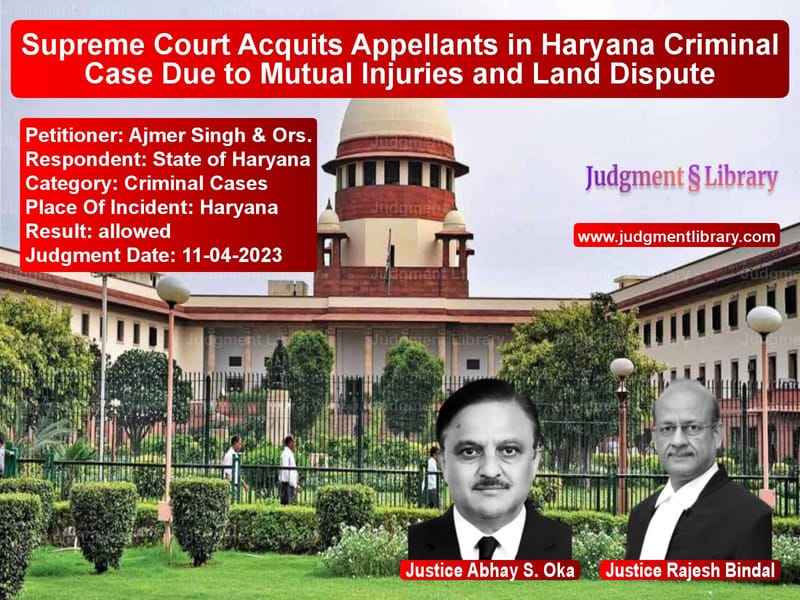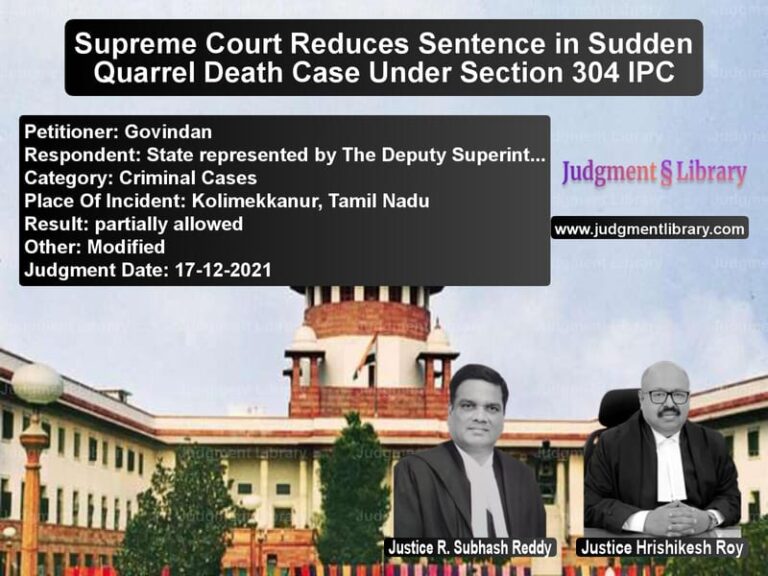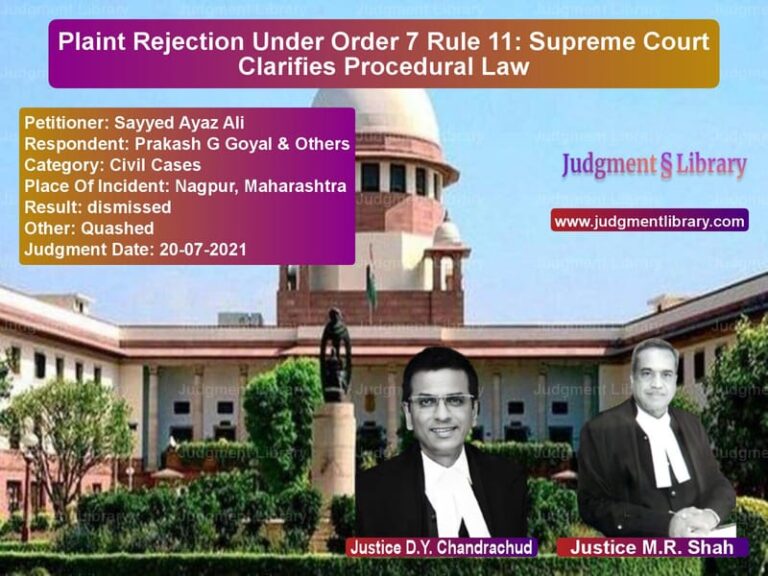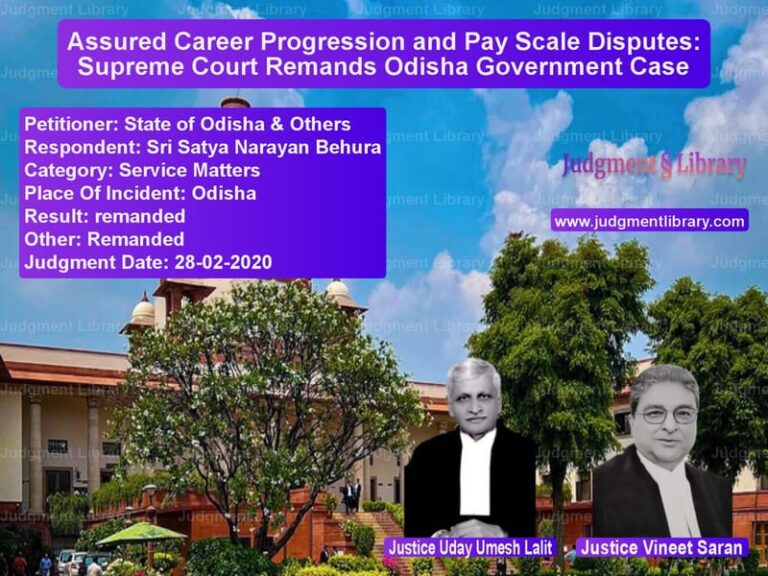Supreme Court Acquits Appellants in Haryana Criminal Case Due to Mutual Injuries and Land Dispute
The case of Ajmer Singh & Ors. vs. State of Haryana was a criminal appeal before the Supreme Court of India, arising from a land dispute that escalated into a violent altercation. The dispute centered around the use of a passage that both parties claimed rights over. The appellants were convicted by the trial court under various sections of the Indian Penal Code (IPC), including Sections 148, 323, 325, and 307 read with Section 149, and sentenced to imprisonment. The High Court upheld the conviction but later modified the sentencing. The Supreme Court ultimately overturned the conviction, considering that both parties had suffered injuries in the altercation.
Background of the Case
The dispute originated on March 27, 1997, when an altercation took place between the complainant party, led by Jagdish Chand, and the appellants. The issue stemmed from the alleged use of a passage that the complainant party claimed to be part of their property. The appellants were traveling on a tractor-trolley through the disputed passage when they were confronted by the complainant party, leading to a violent clash involving lathis and agricultural tools like kassi (spade).
Arguments by the Petitioner (Appellants)
The appellants contended that the complainant party was the aggressor and had been preventing them from using the passage, which was legally part of Gram Panchayat land. Their counsel argued:
- “The complainant party was treating that portion of the land as their own, even though it belonged to the Gram Panchayat.”
- “Immediately after the incident, a civil suit was filed by the complainant party seeking an injunction against the appellants’ use of the land. The suit was dismissed in 2003, confirming that the land did not belong to them.”
- “The appellants also suffered multiple injuries during the altercation, but the lower courts failed to consider their defense.”
- “The incident occurred in a free fight, and there was no premeditated intention by the appellants to attack.”
- “The weapons involved were normal agricultural implements, commonly used in rural areas, and were not intended for harm.”
Arguments by the Respondent (State of Haryana)
The prosecution, representing the State of Haryana, maintained that the appellants were the aggressors:
- “The appellants attacked the complainant party with lathis and a kassi, causing grievous injuries.”
- “Even if the appellants suffered injuries, they were a result of the complainant party’s exercise of their right to self-defense.”
- “Independent witnesses corroborated the version of events presented by the prosecution.”
- “The injuries sustained by the complainant party were far more serious than those suffered by the appellants.”
Supreme Court’s Analysis and Judgment
After reviewing the evidence and hearing arguments from both sides, the Supreme Court noted several key factors:
- Both parties had suffered injuries, indicating that it was a mutual altercation rather than a one-sided attack.
- The passage in question was found to belong to the Gram Panchayat, and not to the complainant party.
- The High Court failed to adequately consider the injuries suffered by the appellants.
- There was no evidence of premeditation or intention to cause serious harm.
In its ruling, the Supreme Court stated:
“Considering the material on record where both parties suffered injuries in a free fight, and the passage, which was the root cause of the fight, has been held to be the property of the Gram Panchayat, the conviction and sentence of the appellants cannot be legally sustained.”
Accordingly, the Supreme Court allowed the appeal and set aside the conviction and sentence imposed by the trial court and the High Court. The bail bonds of the appellants were discharged.
Key Takeaways
- Mutual injuries in an altercation may lead to reconsideration of a conviction.
- Property disputes should be resolved through civil litigation rather than physical altercations.
- Judicial review considers both parties’ claims before reaching a fair decision.
The case highlights the importance of legal clarity regarding property rights and the role of self-defense in criminal cases. The Supreme Court’s decision ensured that justice was delivered fairly based on the evidence presented.
Petitioner Name: Ajmer Singh & Ors..Respondent Name: State of Haryana.Judgment By: Justice Abhay S. Oka, Justice Rajesh Bindal.Place Of Incident: Haryana.Judgment Date: 11-04-2023.
Don’t miss out on the full details! Download the complete judgment in PDF format below and gain valuable insights instantly!
Download Judgment: ajmer-singh-&-ors.-vs-state-of-haryana-supreme-court-of-india-judgment-dated-11-04-2023.pdf
Directly Download Judgment: Directly download this Judgment
See all petitions in Bail and Anticipatory Bail
See all petitions in Attempt to Murder Cases
See all petitions in Fraud and Forgery
See all petitions in Theft and Robbery Cases
See all petitions in Custodial Deaths and Police Misconduct
See all petitions in Judgment by Abhay S. Oka
See all petitions in Judgment by Rajesh Bindal
See all petitions in allowed
See all petitions in supreme court of India judgments April 2023
See all petitions in 2023 judgments
See all posts in Criminal Cases Category
See all allowed petitions in Criminal Cases Category
See all Dismissed petitions in Criminal Cases Category
See all partially allowed petitions in Criminal Cases Category







